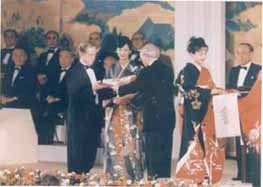Capecchi Wins 2007 Nobel Prize in Physiology or Medicine
Learn More about Mario Capecchi's research.
Mario R. Capecchi talks with his hands, often holding a pencil, sharpened to a fine point, with which he translates his ideas into lines and letters on a sheet of paper.
"A habit," admits Capecchi, who dismisses the marks as "doodles."
But the arrows unraveling from a circle into a straight line aren't aimless scribbles. They describe homologous recombination, the technology Capecchi pioneered in his molecular genetics lab at the University of Utah that has revolutionized mammalian biology--and was almost erased by the National Institutes of Health (NIH).
In 1980, when Capecchi submitted a grant application to the National Institutes of Health that included experiments testing the feasibility of gene targeting in mammalian cells, peer reviewers were skeptical about the probability of success for this part of his proposal and thought that other experiments he planned would be more fruitful. But Capecchi, distinguished professor of human genetics at the School of Medicine, investigator at the Howard Hughes Medical Institute and distinguished professor of biology, had been drawn to molecular biology because of the aura of possibility. He received NIH funding for all of the projects, which enabled him to carry out the mammalian gene targeting experiments, and persevered.
Perseverance is a common theme in stories of great achievements. Adversity can be the incentive an individual needs to forge ahead. Besides, bravado characterized the field of molecular biology when Capecchi entered it as a graduate student at Harvard University in the 1960s. His career, like the new discipline, was nurtured by the legendary figure of James D. Watson, who, along with Francis Crick, determined the structure of DNA.
But Capecchi doesn't bear the reputedly brash manner of his mentor. He is a quiet-spoken man who contemplates his thoughts before they become words--or sketches on a sheet of paper. He adds no flourishes to the lines of his diagrams, no dramatic descriptions to the narrative of his life. Perhaps it is this sense of understatement that draws one's attention to the line running down the side of the paper.
Capecchi's pencil zigzagged as he recounted wandering, homeless, for four years from the north of Italy, where his mother left him with friends before she was deported to a Nazi concentration camp, to the south, where she found him after World War II in a hospital.
"It is not clear whether those early childhood experiences contributed to whatever successes I have enjoyed or whether those achievements were attained in spite of those experiences," Capecchi told an audience in Japan when he accepted the prestigious 1996 Kyoto Prize in Basic Sciences for his discovery of gene targeting. "When dealing with human life, we cannot do the appropriate controls. Could such experiences have contributed to psychological factors such as self-reliance, self-confidence or ingenuity?"
Capecchi is reluctant to draw a bold line linking these as cause and effect, but neither does he cross them out. He may be a geneticist who uses probability theory to calculate the outcomes of experiments, but he also is an individual whose personal life proves that, while some events are not probable, anything is possible.



